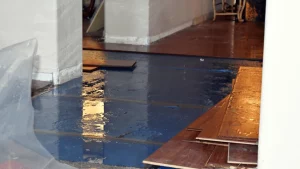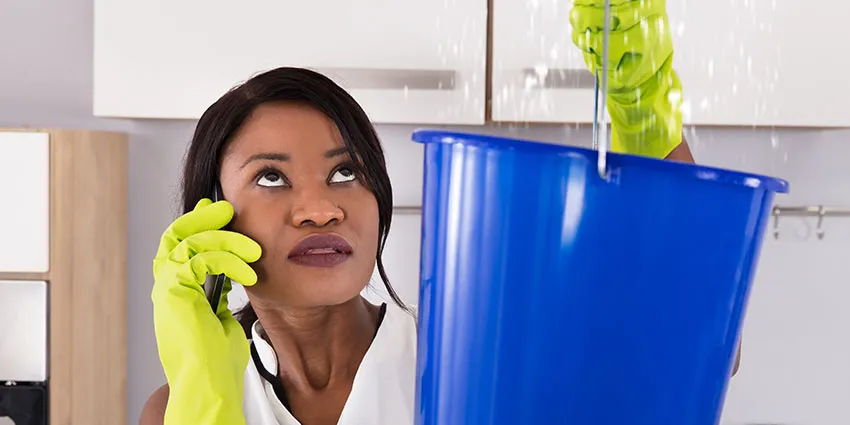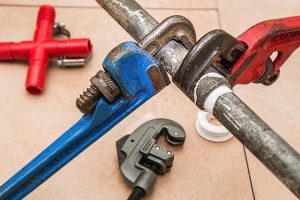In private households, water damage usually occurs as a result of damage to water pipes, such as a burst water pipe.
However, water damage also occurs in the event of natural disasters such as tsunamis or floods. The last possible cause of water damage is the use of extinguishing water in the event of a fire. Either way, it’s usually the worst experience for residents and homeowners.
All the causes have one thing in common: water can cause severe damage to furniture, doors, floor coverings and wallpaper. And in the long run, mold often develops in the brickwork and ceilings.
To ensure that your belongings can be safely put into temporary storage and that your home is habitable again, BOXIE24 has summarised the most important immediate measures for you. Read more about the liability issue and tips to prevent and repair water damage.
Immediate measures after water damage
- In case of a burst water pipe: turn off the stopcock (the water mains tap; the tap that controls the mains water supply)
- Disconnect all electrical lines that are affected or within the range of the water leak: remove the fuses!
- Take photos to document the damage
- Pump out/extract or absorb the water
- Raise your furniture from the wet floor or rent a storage unit to store your furniture for as long as necessary
- Valuable and sensitive items such as pictures, expensive books, musical instruments or other valuable things should be moved out immediately. If you don’t have space for that, self storage is a good option.
- If a particularly valuable and irreplaceable object has already become damp or wet, you should put it in a plastic bag and freeze it. This stops the destruction process. Specialist companies can save your item with special thawing processes.
- Pick up damp carpets, do not role them up, store them and let them dry
- Lower the humidity by ventilating: open the window! If the damage is greater or if there is not enough ventilation: set up a dehumidifier!
- If the damage is more serious, you should contact a specialist company as soon as possible
- Contact your insurance company, landlord or housing association
- Hire a mechanic to determine the cause of the water damage
Protect yourself in the event of water damage
In some cases, water damage is caused by a broken sewage pipe. You can be exposed to germs and bacteria. Therefore, it is advisable to wear appropriate protective clothing such as:
- Rubber boots
- Disposable gloves
- Disposable protective suit
Store your furniture while renovating your house
When your house has to be renovated after the water damage, you can rent a storage unit to store your furniture during the renovation. BOXIE24 offers a free pick-up service for your furniture and other items. We redeliver your items whenever you need. Are you not sure how much storage space you actually need? Use our storage space calculator or give us a call.
Liability in case of water damage
Water damage is not only annoying and a lot of work – it also costs money. Who actually has to pay for the damage? As so often, that depends on the circumstances. Three questions are crucial as to which insurance pays what:
- What is the cause of the water damage?
- Where did the damage occur?
- Have you or anyone else been negligent?
For example, if your washing machine leaks, your home insurance will cover the damage to your home. In case you don’t have a home insurance, you will probably have to pay for the costs yourself. If water seeps into the apartment below you, your liability insurance may cover the damage.
Your homeowners’ insurance is liable for all damage caused by permanently installed parts, like water pipes, on the building itself. However, if the water seeps in from outside, your home owners insurance usually isn’t liable. You can find the damage covered in the fine print of your insurance policy. Individual risks – e.g. storm and flood insurance – can be insured separately.
If you rent a property, the home insurance usually is included in the rent or service costs. Therefore, your landlord or housing association cannot hold you personally liable if the water damage was caused only by slight negligence. They will have to file a claim with the insurance company. This has been decided by the Federal Court of Justice. However, if the landlord or housing association can prove that you acted with gross negligence as a tenant, you will be the one liable for the damage.
According to a ruling by the Oldenburg Higher Regional Court, this was the case with a tenant who had opened the tap of his washing machine without an aquastop device and without ever checking the poorly attached hose. (Ref.: 3 U 6/04)
If you as the tenant are not responsible for the damage, you can reduce the rent. For this, the damage and the depreciation of the apartment must be assessed by an expert. Furthermore, if your apartment is not habitable for a long time after the water damage, you can terminate the lease contract without notice – provided that you are not responsible for the damage yourself.

Water damage repairs
At first glance, the cause is often less obvious than a defective washing machine. It is therefore necessary to determine where the water is coming from and to what extent the damage has already occurred. Leak detection and moisture measurement should be carried out by a specialist company. There are various methods of drying that are used depending on the material. Often wallpaper and floor coverings have to be removed, new tiles laid, and painting work carried out.
After water damage: tips & advice on drying
In no case should you be careless about water damage. All affected items should be dried outside the house or apartment. Self-storage at BOXIE24 is suitable for this.
To prevent mould formation on walls and floors, they should be professionally dried. Floating screed can be particularly problematic here, as the moisture can have penetrated under the screed and soaked insulating layers. This damage is not immediately obvious! Therefore, if in doubt, have a specialist company inspect the walls and ceilings.
Moisture in a wall can also go unnoticed and look completely normal at first glance. That is why it always makes sense to call in a specialist or expert for water damage. He can carry out a professional moisture measurement of the affected areas and components. Consequential damage – especially mould – caused by overlooked moisture can thus be prevented.
Mold in walls, ceilings and generally in living spaces is poisonous and extremely dangerous. The moulds lead to respiratory diseases, allergic reactions, asthma, bronchitis and other diseases.



